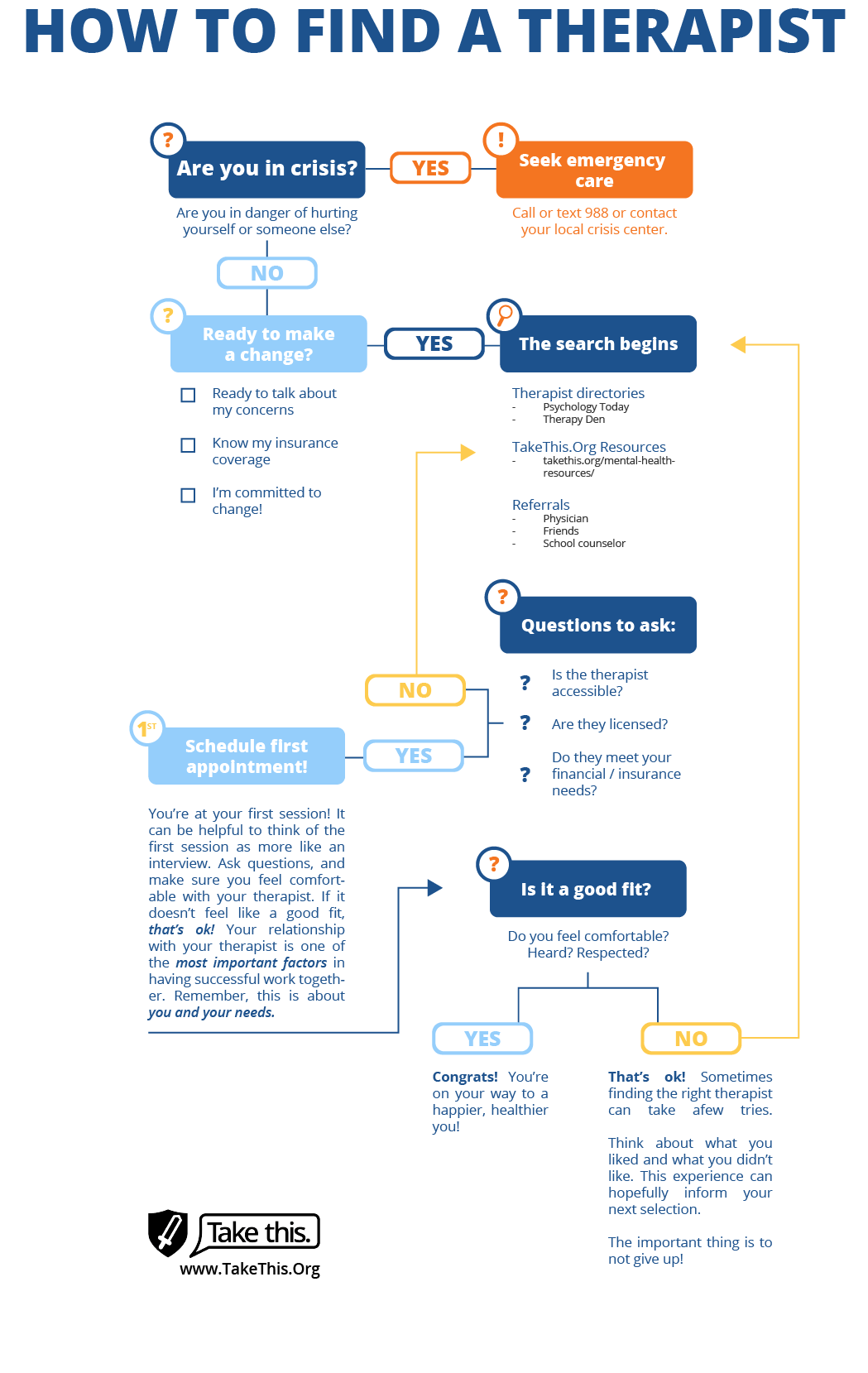To find a therapist, start by conducting online research or asking for recommendations from friends, family, or healthcare professionals. Look for therapists in your area specializing in the specific type of therapy you need, and check their credentials and reviews to ensure they are reputable.

Credit: www.takethis.org
Understanding The Need For Therapy
Therapy can be incredibly valuable for individuals experiencing emotional distress. Recognizing the signs of emotional distress is the first step towards finding a therapist. These signs may include persistent sadness, excessive worry or anxiety, difficulty sleeping, loss of interest in activities, and changes in appetite or weight. Once you have acknowledged the need for therapy, it is important to understand the benefits it can provide. Therapy offers a safe space to express thoughts and feelings, develop coping mechanisms, and gain a deeper understanding of oneself. It can help improve mental well-being, enhance self-esteem, and strengthen relationships. Therapy also equips individuals with effective tools to manage stress, anxiety, and other emotional challenges. With the guidance and support of a therapist, individuals can navigate life's hurdles more effectively and achieve personal growth.
:max_bytes(150000):strip_icc()/find-therapist-1-7c23a828d9454ec4bc466700b2e9fa55.jpg)
Credit: www.realsimple.com
Finding The Right Type Of Therapy
When searching for a therapist, it is important to find the right type of therapy that suits your needs. Exploring different therapy approaches can help you determine which one aligns with your personal preferences and goals. Consider the various types of therapy available, such as cognitive-behavioral therapy (CBT), psychodynamic therapy, and humanistic therapy.
Cognitive-behavioral therapy (CBT) focuses on modifying negative patterns of thinking and behavior to promote positive change. Psychodynamic therapy explores how past experiences and unconscious thoughts influence current behaviors and emotions. Humanistic therapy emphasizes personal growth and self-actualization.
It is essential to assess which approach resonates with you the most. Think about what you hope to achieve through therapy and the therapeutic techniques that you feel would be most effective for you. Remember to consider factors such as your comfort level with the therapist, the duration of therapy sessions, and any financial considerations.
Ultimately, finding the right type of therapy involves a combination of research, intuition, and open communication with potential therapists. Take the time to explore different therapy approaches and consider how they align with your personal preferences and goals in order to make an informed decision.
Steps To Find A Suitable Therapist
Steps to Find a Suitable Therapist:
Researching Therapists in Your Area:
Start by conducting an online search for therapists in your area. Check out their websites and read their bios to get an idea of their specialties and approach to therapy. Look for reviews and ratings from their previous clients to gauge their reputation.
Evaluating Therapist Credentials and Experience:
Verify the therapist's credentials and licenses. Make sure they have the necessary qualifications and certifications. Look for any disciplinary actions or complaints against them. Consider their experience, specifically in the area you need help with. A therapist with expertise in your specific area of concern is more likely to be effective.
Interviewing and Assessing Potential Therapists:
Contact a few potential therapists and schedule initial consultations or phone interviews. Prepare a list of questions to ask them about their approach, fees, availability, and how they handle confidentiality. Pay attention to their communication style and how comfortable you feel discussing your concerns. Trust your instincts and choose a therapist with whom you have a good rapport.

Credit: www.npr.org
Frequently Asked Questions For How To Find A Therapist
How Can I Find A Therapist Near Me?
Finding a therapist near you is easy with online directories, therapy search engines, or by asking for recommendations from your doctor or friends. Make sure to consider factors like specialization, location, cost, and availability when choosing a therapist.
What Qualifications Should I Look For In A Therapist?
When searching for a therapist, look for those who are licensed, have relevant experience in your specific issue, and have a compatible therapeutic approach. Additionally, ensure they belong to professional organizations and regularly participate in continued education to stay up-to-date in their field.
How Do I Know If A Therapist Is A Good Fit For Me?
To determine if a therapist is a good fit for you, schedule an initial consultation or a few sessions. Pay attention to how comfortable and understood you feel, as well as their ability to provide guidance and support. Trust your intuition when deciding whether to continue working with them.
What Types Of Therapy Are Available?
Therapy encompasses various approaches such as cognitive-behavioral therapy, psychoanalysis, person-centered therapy, and more. Different therapies are suitable for different concerns. It's important to discuss your needs and preferences with a therapist, who can guide you toward the most appropriate approach.
Conclusion
Finding a therapist that is the right fit for you can seem challenging, but with the right approach, it becomes much easier. By understanding your needs, doing thorough research, seeking referrals, and considering the therapist's specialties, you can find someone who can provide the support and guidance you need.
Prioritizing your mental health is essential, and finding the right therapist is a crucial step towards achieving that goal. Remember, you deserve a therapist who understands and empowers you on your journey to emotional well-being.
Comments
Post a Comment